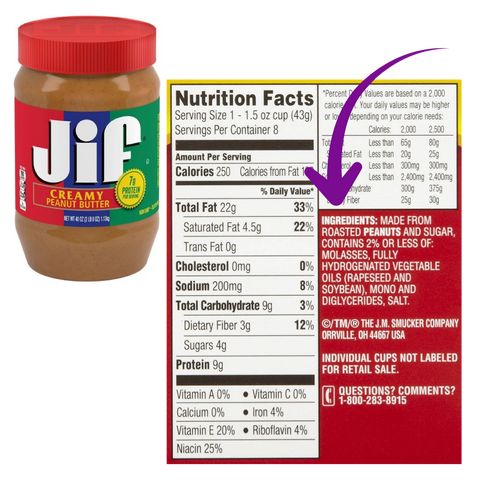Know What's in Your Food
- Jaime Heer, FNTP, RWS

- Feb 5, 2020
- 3 min read
Updated: Feb 19, 2020
Food is not just energy. Food is information.
The nutrients in food contain instructions that communicate messages to your genes, hormones, immune system, gut flora, and every other system in your body. Enjoying a diet that is high in real, whole foods is the best way to provide yourself with the nutrients & information needed to fuel your cells and keep you healthy.
With that being said, I totally understand that in today's fast paced world pre-prepared foods can make life much easier. While the majority of mainstream packaged foods should be avoided, there are many great companies that are committed to creating quality products. You just need to know what to look for and what to avoid in order to be able to make the most informed grocery shopping decisions.
Ready for Packaged Food Purchasing Tips? Keep scrolling...
Look at the ingredients, not the calories.
What it is made from is most important. If it is made from quality, whole food ingredients then you won't need to worry so much about the calories. Your body knows how to digest and absorb real food nutrients and it will naturally give you a feeling of fullness when you have eaten enough.
Below are a few examples of foods that are often considered "healthy" but when you take a closer look you'll be surprised to see a lot of processed ingredients & chemical additives. Next to them you'll find a healthier alternative.
When it comes to ingredients, less is best. Foods that are less processed will not contain as many food additives and therefore will have less ingredients. They may not have as long of a shelf life, but that's a good thing. Items that can sit on a shelf for weeks, months or even years are not real food. They will wreak havoc on your cells causing digestive discomfort, signs of aging, inflammation, allergies, skin issues, cancer... need I go on?
Steer clear of junk oils, refined sugars and artificial sweeteners.
These are just more bad ingredients that wreak havoc on your cells and over-all health. They are often hiding in sauces & dressings so always be on the look out.
- Junk Oils: hydrogenated, canola, cottonseed, corn, rapeseed & soybean
- Refined sugars: corn sugar, corn syrup, cane sugar, cane juice, sucrose, fructose, dextrose, dextrin, agave nectar, brown rice syrup, beet sugar, stevia extract, etc...
- Artificial sweeteners: aspartame, acesulfame potassium, neotame, sacharrin, sucralose, etc...
Avoid chemical additives.
There are 10,000+ food additives, many of which have not been proven safe and are given a free pass by the FDA anyway. I go by this Rule of Thumb: If you don't know what it is, your body won't either.
Examples include: "natural flavors", citric acid, food colorings, carageenan, xantham gum, sodium nitrate, monosodium glutamate (MSG), calcium carbonate, monoglyercides, diglyercides, etc...
If weight is a concern, look at "Total Carbohydrates”, especially “Added Sugars".
A diet high in starchy & refined carbohydrates leads to imbalanced blood sugar. This creates chronic stress and inflammation within your body which is linked to weight gain, heart disease, type 2 diabetes and autoimmune disorders. Ditch the starchy/refined carbs and you will likely notice a welcome shift in your waistline.
There is no one size fits all Carbohydrate Ratio as we are all unique in our genetics and lifestyle. If you are interested in determining a more accurate Carb Ratio for your body CLICK HERE.
So what packages foods can you eat? Here are a few of my favorite 'Nutritionist Approved' brands:
Sun & Swell Foods - Snacks Epic Provisions - Meat Snacks Organic Valley - Dairy Products Lark Ellen Farms - Nuts & Granola
Elemental Superfood - Energy Bars Hu Kitchen - Dark Chocolate
MALK Organics - Nut mylks Primal Kitchen - Dressings & Oils Organico Bello - Pasta Sauce Outer Aisle Gourmet - Sandwich Thins & Pizza Crusts Siete Foods - Tortillas & Chips
Resources:
US Food & Drug Administration - Overview of Food Ingredients, Additives & Colors
















Comments